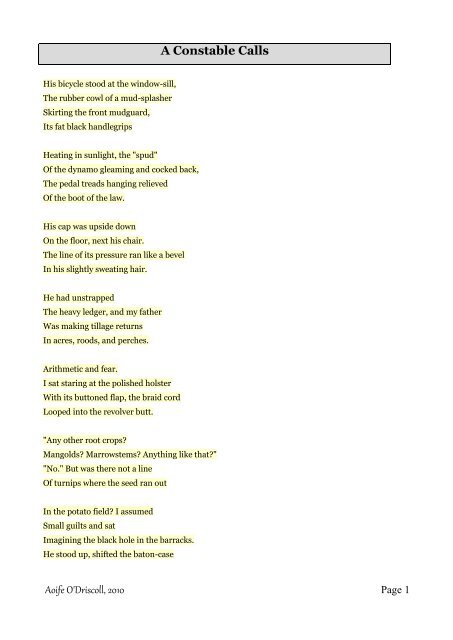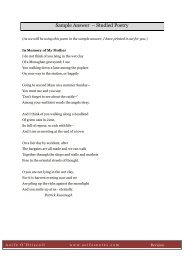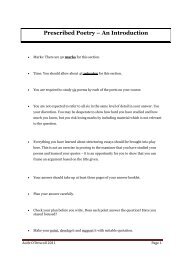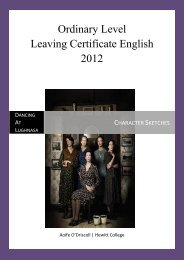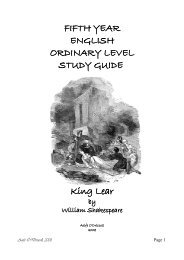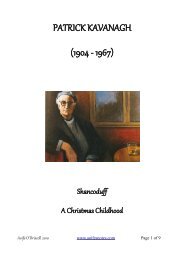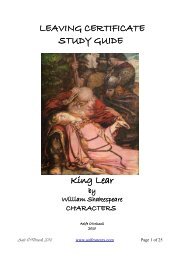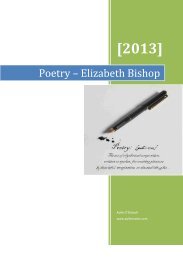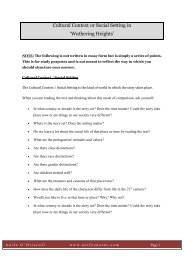Heaney .pdf - Aoife's Notes
Heaney .pdf - Aoife's Notes
Heaney .pdf - Aoife's Notes
Create successful ePaper yourself
Turn your PDF publications into a flip-book with our unique Google optimized e-Paper software.
His bicycle stood at the window-sill,<br />
The rubber cowl of a mud-splasher<br />
Skirting the front mudguard,<br />
Its fat black handlegrips<br />
Heating in sunlight, the "spud"<br />
Of the dynamo gleaming and cocked back,<br />
The pedal treads hanging relieved<br />
Of the boot of the law.<br />
His cap was upside down<br />
On the floor, next his chair.<br />
The line of its pressure ran like a bevel<br />
In his slightly sweating hair.<br />
He had unstrapped<br />
The heavy ledger, and my father<br />
Was making tillage returns<br />
In acres, roods, and perches.<br />
Arithmetic and fear.<br />
I sat staring at the polished holster<br />
With its buttoned flap, the braid cord<br />
Looped into the revolver butt.<br />
"Any other root crops?<br />
A Constable Calls<br />
Mangolds? Marrowstems? Anything like that?"<br />
"No." But was there not a line<br />
Of turnips where the seed ran out<br />
In the potato field? I assumed<br />
Small guilts and sat<br />
Imagining the black hole in the barracks.<br />
He stood up, shifted the baton-case<br />
Aoife O'Driscoll, 2010 Page 1
Further round on his belt,<br />
Closed the domesday book,<br />
Fitted his cap back with two hands,<br />
And looked at me as he said goodbye.<br />
A shadow bobbed in the window.<br />
He was snapping the carrier spring<br />
Over the ledger. His boot pushed off<br />
And the bicycle ticked, ticked, ticked.<br />
Glossary:<br />
Dynamo: a device which changes energy of movement into electrical energy.<br />
A dynamo on a bicycle will power a pair of lights while the wheels are going round.<br />
When it is not needed to power the lights, the dynamo can be pulled back from the wheel of the bi-<br />
cycle.<br />
Bevel: a slanting, angled line. In the poem, this happens when the pressure of the rim of the po-<br />
liceman’s hat creates a line in his hair.<br />
Roods and perches are measurements of land.<br />
Mangolds and marrowstems are crops.<br />
Domesday book: This was a record of all the land and livestock in England in the 11 th century.<br />
The king ordered that a record be taken so that each landowner could be taxed accordingly. It was<br />
called the domesday book because it was like the book of Judgement in the bible. That is to say,<br />
those who tried to cheat on their taxes by not declaring all they owned would be severely punished,<br />
in the same way that sinners would be punished on the last day of the world – or the day of doom.<br />
Summary and Analysis:<br />
Seamus <strong>Heaney</strong> tells us about a memory from his childhood. A policeman visits his family farm to<br />
take a record of the crops that <strong>Heaney</strong>’s father is growing.<br />
The description of the bicycle is our first indication that the policeman is not welcomed and that he<br />
is seen - by <strong>Heaney</strong> at least – as an intimidating, unpleasant figure. Everything in the description<br />
of the bike hints at this. The ‘fat black handlegrips’ sound ugly and unpleasant, and seem to<br />
suggest that the bicycle’s owner might be similarly unappealing. The dynamo is ‘cocked back’,<br />
reminding us of the trigger of a gun. The pedals are ‘relieved / Of the boot of the law’, implying<br />
that the constable is a man whose presence causes pressure and discomfort. He represents ‘the law’<br />
Aoife O'Driscoll, 2010 Page 2
and is therefore disliked. At that time in Northern Ireland, most Catholics would have viewed the<br />
police as an oppressive force. The descriptions of the constable reinforce that idea. The harsh ‘k’<br />
and ‘g’ sounds in the opening stanzas emphasise the harshness of the authority the constable<br />
represents and they also create a sense of tension.<br />
It is clear that the constable is not welcome in the <strong>Heaney</strong> home. His hat is on the floor: nobody<br />
has taken it from him or offered him a place to put it. Again, the physical description of the<br />
constable focuses on unattractive aspects of his appearance. His hair is ‘slightly sweating’ and<br />
marked by the cap he has been wearing. The idea of his oppressive presence is again picked up by<br />
the reference to the ledger (record book) being ‘heavy’.<br />
The young <strong>Heaney</strong> is filled with fear as he watches the constable. He stares at his gun and<br />
remembers every detail of it in its holster. The tone of the poem is one of fear.<br />
Meanwhile, the constable continues to record the family’s crops. <strong>Heaney</strong>’s father answer’s the<br />
constable’s questions with curt, one word replies, showing how unwelcome both he and his<br />
interrogation are. The young boy is terrified to hear his father lying about the crops. He knows<br />
that there is a line of turnips which his father has not admitted to, and in his horrified imagination,<br />
he sees his father – and maybe even himself – being taken to the barracks and thrown in a cell.<br />
The constable takes his leave, putting the ledger away. <strong>Heaney</strong> refers to it as the ‘domesday book’<br />
because he is so terrified that his father will be judged and punished for his little lie about the<br />
turnips. This name for the ledger also reinforces the idea of the constable belonging to an<br />
oppressive force which holds the threat of violence over people like <strong>Heaney</strong>’s father. Of course, the<br />
young boy is grossly exaggerating the policeman’s power in this instance. To a small child, the lie<br />
about the turnips seems enormous, but in reality, nobody would be thrown in jail for such a minor<br />
offence, even if it were to be discovered. However, young <strong>Heaney</strong>’s emotions towards the constable<br />
reflect his father’s dislike and resentment of being held to account for his crops. The constable<br />
looks at the young boy and says ‘goodbye’. This reminds us that the constable is, in reality, just a<br />
man. This is the only instance of his humanity. It is not likely that he wishes to appear threatening<br />
or intimidating, but that is how he is viewed by the Catholic community. He is seen as a<br />
representative of an unwelcome, despised, oppressive authority.<br />
Outside the window, the constable is for a moment just a shadow. There is something shadowy<br />
about the descriptions of him throughout the poem. We never learn any details about him as a<br />
person: what we learn of him is based on the images of menace and threat.<br />
Aoife O'Driscoll, 2010 Page 3
The constable cycles off, and the sound it makes is reminiscent of a clock, or of the timer of a bomb.<br />
It ticks and ticks, which evokes the idea of a ticking timebomb that is waiting to go off. This could<br />
be a reference to the mounting tension in Northern Ireland at the time and the inevitability of this<br />
hostility eventually exploding into violence.<br />
Theme:<br />
Conflict: The poem describes a rather minor incident, but one which is symbolic of the tension<br />
between Catholics and Protestants in Northern Ireland. The constable is a member of the Royal<br />
Ulster Constabulary, and as such is seen as in an enemy camp. The RUC were not seen as impartial<br />
and were viewed by most Catholics as a Protestant police force which acted in the interest of their<br />
own people rather than in the interests of everyone, equally.<br />
Aoife O'Driscoll, 2010 Page 4
A Call<br />
‘Hold on,’ she said, ‘I’ll just run out and get him.<br />
The weather here’s so good he took the chance<br />
To do a bit of weeding’.<br />
So I saw him<br />
Down on his hands and knees beside the leek rig,<br />
Touching, inspecting, separating one<br />
Stalk from the other, gently pulling up<br />
Everything not tapered, frail and leafless,<br />
Pleased to feel each little weed-root break,<br />
But rueful also…<br />
Then found myself listening to<br />
The amplified grave ticking of hall clocks<br />
Where the phone lay unattended in a calm<br />
Of mirror glass and sunstruck pendulums…<br />
And found myself then thinking: if it were nowadays,<br />
This is how Death would summon Everyman.<br />
Next thing he spoke and I nearly said I loved him.<br />
Glossary:<br />
Everyman: A late fifteenth century morality play, in which allegorical characters are used to<br />
examine the question of Christian salvation. When the character of Everyman, who represents all<br />
mankind, is summoned by death, he tries to convince the other characters to accompany him. In<br />
the end, only the character Good Deeds accompanies him.<br />
Summary and analysis:<br />
The poet is phoning his father. His mother answers and tells him that his father is out in the<br />
garden. She goes out to get him, leaving the poet holding the line. As he does so, he imagines his<br />
father kneeling beside a bed of leeks. He sees him pulling out the tiny weeds and feeling mixed<br />
emotions as he does so. His father would be happy to have removed the weeds, but might feel a<br />
little bit of sadness for having to kill them. The weeds are vulnerable, and perhaps <strong>Heaney</strong> is<br />
suggesting that we are equally vulnerable to death. Life is fragile. The father’s movements are<br />
gentle as he works, suggesting that he takes is a careful, sensitive, kindly man. The long vowel<br />
sounds in this section of the poem slow down the action and accurately reflect the slow pace of the<br />
Aoife O'Driscoll, 2010 Page 5
elderly man as he carefully removes the sprouting weeds from amongst his vegetables.<br />
The direct speech in the poem adds to the ordinariness of the events being described. There is<br />
nothing particularly striking about this phone call.<br />
As <strong>Heaney</strong> holds the line, he hears the clocks in his parents’ hall ticking. He can visualise the quiet<br />
hall with its mirrors and glass on the clock cases. He imagines sunlight shining in and striking the<br />
glass. The hall is a calm, peaceful place. However, there is a hint of death, even in this description.<br />
The ticking of the clocks is ‘grave’ – a word which means serious or solemn, but also makes us<br />
think of death and graveyards. Perhaps the poet is reflecting on how quiet the house will be when<br />
his father is dead. Again, the long vowel sounds slow down the pace of the poem, which is<br />
appropriate for the poet’s reflective mood.<br />
The poet is struck by an odd thought. He imagines that if the play ‘Everyman’ were written<br />
nowadays, this is how Death would summon Everyman. In the original play, Death called to the<br />
door, but now he would probably phone. Death is not frightening in this vision. Rather, he is<br />
ordinary and gentle. He takes life in the same calm, quiet way that the poet’s father takes the<br />
weeds from the earth. If Death is like a phone call from a loved one, then it is even less frightening.<br />
This is quite a reassuring image of death. The tone is a mixture of celebration and sadness.<br />
<strong>Heaney</strong> loves his father dearly, but is aware that he is aging and that his death is inevitable.<br />
At that moment, his father comes to the phone and the poet is filled with a sudden surge of emotion.<br />
He very nearly tells his father that he loves him, but checks himself and does not. He and his father<br />
do not have the kind of relationship in which such things are said. This is fairly typical of many<br />
father-son relationships.<br />
Themes:<br />
The relationship between fathers and sons: The poem suggests that, even though fathers<br />
and sons may love one another, this is not a love that is openly expressed. His father is a farmer at<br />
heart and is probably more comfortable working on the land than talking on the phone.<br />
Death: Every moment that passes brings us closer to death. The ticking of the clocks in the<br />
hallway reminds the poet that time is passing. Even the weeding is a form of death, and the<br />
fragility and vulnerability of the tiny weeds reminds us of our own frailty and powerlessness in the<br />
face of death.<br />
Aoife O'Driscoll, 2010 Page 6
There we were in the vaulted tunnel running,<br />
You in your going-away coat speeding ahead<br />
And me, me then like a fleet god gaining<br />
Behind you before you turned to a reed<br />
The Underground<br />
Or some new white flower japped with crimson<br />
As the coat flapped wild and button after button<br />
Sprang off and fell in a trail<br />
Between the Underground and the Albert Hall.<br />
Honeymooning, mooning around, late for the Proms,<br />
Our echoes die in that corridor and now<br />
I come as Hansel came on the moonlit stones<br />
Retracing the path back, lifting the buttons<br />
To end up in a draughty lamplit station<br />
After the trains have gone, the wet track<br />
Bared and tensed as I am, all attention<br />
For your step following and damned if I look back.<br />
"Marie and I were then on our honeymoon and as well as calling with my editor in Russell<br />
Square, we went to a Promenade concert in the Albert Hall, by the underground, of course, Marie<br />
in her white going away coat that had received a beetroot stain in the Museum Tavern the night<br />
before, both of us late and running down the corridor," Seamus <strong>Heaney</strong> in ‘The Guardian’, 2009.<br />
Glossary:<br />
Fleet god: The god of nature, Pan<br />
Before you turned into a reed: In ancient mythology, Pan chased a nymph who turned into a<br />
bed of reeds in order to evade him.<br />
Japped with crimson: the white coat was stained with beetroot<br />
Hansel: From the story ‘Hansel and Gretel’.<br />
Damned if I look back: In the Greek myth of Orpheus and Eurydice, Orpheus travelled to the<br />
Underworld to bring his wife back when she died. He succeeded, but the only condition was that<br />
he did not look back at his wife until they reached the earth. He glanced back at her just as they<br />
were leaving the Underworld, and he lost her forever.<br />
Aoife O'Driscoll, 2010 Page 7
Summary and analysis:<br />
The poet remembers an incident from his honeymoon. He and his wife are running from a tube<br />
station in London, desperate to reach the Albert Hall in time for ‘The Proms’. (This is a musical<br />
evening.) His wife is wearing her ‘going-away coat’, a coat bought specially for leaving the wedding<br />
party and wearing on honeymoon. The poet addresses the poem directly to his wife, and this<br />
creates a sense of intimacy and closeness between the couple. The verbs are dynamic: ‘running’,<br />
‘speeding’, ‘gaining’.<br />
<strong>Heaney</strong> is reminded of the myth of the god Pan who chased a beautiful nymph, Syrinx. His designs<br />
on her were thwarted when she transformed herself into a bed of reeds in order to hide from him<br />
and preserve her virginity. <strong>Heaney</strong> rather playfully compares his running after his new wife to this<br />
mythological scenario. Perhaps, he thinks, she might turn into a white flower, splashed with red.<br />
This is a reference to her white coat stained with a little spilled beetroot juice, but could also refer<br />
to virginal innocence stained with the blood of a first sexual experience.<br />
There are several references to the moon in this poem. The moon is associated with change, with<br />
the tides and with the passing of time. ‘Time and tide wait for no man.’<br />
As they run, the poet’s wife’s coat flaps and buttons fly off. This reinforces the idea of the speed<br />
and the energy of the chase. There is also a reference to Hansel and Gretel who, in the fairytale,<br />
found their way by following a line of dropped pebbles.<br />
The tone of the poem changes now from one of excitement and energy to one of darkness. He sees<br />
himself and his wife returning to that tube station, following the trail of dropped buttons. The<br />
station is dark and eerie. The poet is agitated and tense, something he compared to the dangerous<br />
tension in the electrified train tracks.<br />
How do we interpret the last lines? Is the poet talking about leading his wife to safety through the<br />
London streets and tube stations? He alludes to the myth of Orpheus and Eurydice, and tells<br />
himself not to look back at her. Is this because he is determined to lead her to safety as quickly as<br />
possible, so will not look back, or is it because if he does look back he will be damned? Does he<br />
mean that we cannot look back at the past, at the early days of marriage?<br />
We must examine the three myths or stories used to illustrate this poem.<br />
1. The story of Pan and Syrinx is one of lust and passion<br />
Aoife O'Driscoll, 2010 Page 8
2. The story of Hansel and Gretel is a cautionary tale and returning home was not really an<br />
option for them.<br />
3. The story of Orpheus and Eurydice is another cautionary tale. By looking back at his wife,<br />
Orpheus lost her forever.<br />
Is this poem then telling us not to look back?<br />
Think of Eavan Boland’s ‘Love’. Interpreted in a certain way, this poem could be said to express<br />
some of the same ideas.<br />
Theme:<br />
Marriage: The poem could be seen to say that the early excitement of marriage dwindles and that<br />
the pursuer can become the pursued. It can also be seen to say that while the husband’s role in the<br />
early days of the marriage may be that of the lustful pursuer, he moves to becoming the protector<br />
and the one who must ensure his family’s safety and security.<br />
Aoife O'Driscoll, 2010 Page 9


